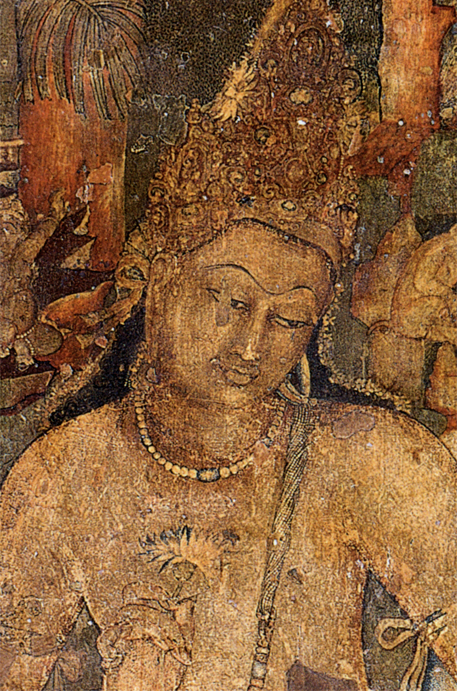The Ajanta Caves are
situated in the state of Maharastra in India. The site is
near Bombay. We can reach the caves from the city of Jalgaon, too.
This city is just 25 miles away from the caves. Another city
is Aurangabad. We can go to that city and reach Ajanta by
travelling by road.
Padmapani, Ajanta Caves, India
The caves
of AJANTA are the world's greatest monument. This ancient place is
recognized as a historical monument by UNESCO, too.
How to Reach Ajanta
Caves.
It is just 100 km
away from the city of Aurangabad in the state of Maharastra in India.
Aurangabad is well connected with other Indian cities by Air, By road and by
train. Elora caves are just 25 km from Aurangabad. So, book an Air Ticket, and
land at Aurangabad airport.
In
Though
built during the period running from the second century BC to the second century
AD, these caves were discovered in the year 1819. Apart from the beautiful
carvings are done on the walls of the caves, the paintings done here are the most attractive thing for tourists.
Travellers coming from all over the world love to see these ancient paintings done in
Buddhist Style. Though most of the paintings here can be related to the period
of the 2nd century BC to the 2nd century AD, some of them were done in about the fifth
century AD.
It is believed that these cave paintings are done by Buddhist
monks and other artists. Most of the paintings show the influence of religion.
The characters painted are mainly Buddha and Bodhisattvas, a Buddhist monk. The
artworks depict stories known as Jatakas. All the materials used in these
paintings came from the local area. The artists have done their work on a
ground of mud-plaster. The technique used seems to be tempera.
This is the entrance of cave No. 9, the main cave preserved. The
half-moon curved gate is a major architectural design of Indian temples. In the case of caves, such space enables them to get lighter inside the cave; and it
also facilitates the excavation of stones while carving the stones out of the
caves. The excavation is done from top to down in such caves'
construction.
AJANTA CAVE PAINTINGS
The caves of Ajanta are one of the greatest
monuments in the world. Being ancient, this place is recognized as a historical
monument by UNESCO. Visiting these caves would be a memorable experience for any
person coming to form any place in the world. It is believed that the
Buddha devotees and monks lived here and did sculptures and paintings as
part of their worship towards Buddha.
It is
believed that these cave paintings are done by Buddhist monks and other
artists. Most of the paintings show the influence of religion. The characters
painted are mainly Buddha and Bodhisattvas, a Buddhist monk. The artworks depict
stories of Buddhism. All the materials used in these paintings came from the
local area. The artists have done their work on a ground of mud-plaster. The
technique used seems to be tempera.
| WALL PAINTING - Head of Bodhisattva Indischer Maler des 7. Jahrhunderts |
The artists, may they
be the sculptor or a painter, always try to depict the life of the people they
live in. so had done the artists who did the artworks in Ajanta and Ellora
caves. Here the depiction of all types of people of the contemporary social
strata is done. We can see the kings and the slaves; the carvings and paintings
of the divine musicians; and the dancers of the courts, known as Apsaras, the
divine women dancers.
These ancient caves were almost forgotten by the people living in the surrounding areas. Once a company of British soldiers passed from this region and the officers found these caves in the nineteenth century. Otherwise, these monuments were hidden under the green vegetation of forests of the state of Maharashtra. (Image courtesy By Indischer Maler des 7. Jahrhunderts [public domain], from Wikimedia Commons )

No comments:
Post a Comment